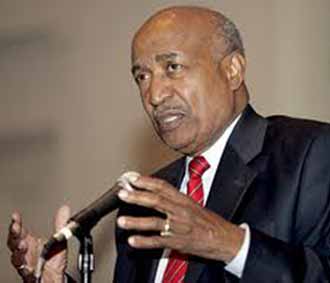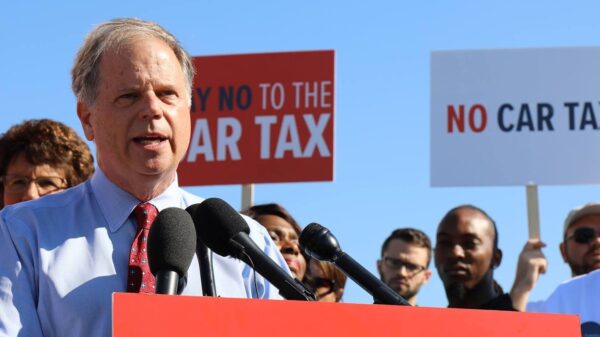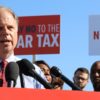By Bill Britt
Alabama Political Reporter
MONTGOMERY—Many words have been used to explain the departure of Judge Mark Kennedy from Chairmanship of the Alabama Democratic Party, but only a handful have been printed to understand the position of one of the last heroes of Alabama’s democratic legacy.
Love him or hate him, Dr. Joe Reed stands as one of the remaining titans of Alabama’s Democratic Party. A man who for a decade has fought and bled Democratic blue. Like the first pantheon of Greek gods and goddesses, Reed held sway over democratic politics in Alabama during its Golden Age.
In 2010, Alabama voters rejected Democrats en masse and now the state seems firmly in the grip of a Republican super majority.
During the last several days the airing of a so-called feud between Kennedy and Reed has been the lead in many news accounts.
Now, Reed tells his side of the story to the Alabama Political Reporter.
“Let’s start from day one,” said Reed in what was to be an hour-long interview. “I had not really known Judge Kennedy before he came to us and asked to become Chairman of the Party,” said Reed. “I knew him as a public servant and that was about all.”
Reed says that Kennedy approached him about taking over the helm of the party after the departure of Joe Turnham.
“He came and asked me if I would help him run as Chairman of the party, and I said to him, ‘Why not?’” Reed said that Kennedy was given the job basically because there was no one else who really wanted it. “He served only two years and four months and during that time we talked and got along okay,” said Reed.
But there were problems, Reed said that some things occurred “that caused me some concerns.” One was Kennedy’s failure to submit a budget in December 2012, in accordance with the party’s bylaws.
“The Democratic bylaws require, among other things, that the chairman submit a budget by the 15th day of December,” said Reed, “after that the executive board then would normally meet the last week in December.” But Reed says, “The budget was not submitted, neither did we have a meeting.”
Reed said there were staff concerns during Kennedy’s tenure in particular the firing Felix Parker. Parker served in part as director of voter management he was terminated from that position on January 7, 2013. It has been reported that Reed gave Kennedy orders to rehire Parker and that Kennedy refused.
Reed seemed to indicate that there was some problem in Kennedy’s mind with the fact that Parker worked with the Black Caucus on the reapportionment issues. Reed said that having someone to assist in that role has been in existence “since the days of Bob Vance.” Reed said, “There was always somebody there to help the Black Caucus. All the other chairs had folks…had someone to help…this was no different…when we had money to hire somebody.”
There was also to be contention over the opening of a field office in Birmingham. It has been said that Kennedy wanted to establish a bigger presence in the financial center of the state to attract a larger donor base. Reed said he and the executive committee were left completely in the dark as Kennedy executed his “plot,” as Reed referred to the plan.
“At no time, at NO time, did the chair bring that information to the executive board or even talk to anybody about it,” said Reed.
According to Reed it was the re-occurrence of command without consent that began to cause a rift between Kennedy and the executive committee.
“I went out to California to the Rose Bowl game….When I came back Felix had been fired. At no time did the Chair talk to me or say anything about it,” said Reed. “Then, when I went to the inauguration…it was on the wire that the chairman had employed two new folk to work out of the Birmingham office.”
He continues, “No budget had been adopted, no money had been laid aside for that and the executive board knew nothing about it. These are the facts.”
Around this time many board members began to question Kennedy’s activities and ask that a meeting be set to speak with Kennedy. “I called the chairman. I said, ‘Mr. Chairman, some of the members want to meet and talk to you about these personnel matters including Felix.’ The chairman said, ‘I will talk to only you and Nancy Worley.’ I said Mr. Chairman, you can’t just talk to two people, that’s not gonna solve this. So, he then said ‘Well, maybe I’ll bring some of the staff.’ I said ‘No, that doesn’t make up the board.’”
Reed said that Kennedy would not agree with a meeting of the board, so the executive committee was forced to use its powers under the bylaws to bring Kennedy to the table. Under the bylaws, eight members of the board can call a meeting itself. “We notified him that we wanted a meeting and set the date and time and place we wanted it to be…and the issues we wanted cover.”
The dust-up at the meeting has been widely reported. This has also been given as the reason in part that Kennedy resigned. However, Reed doesn’t buy the narrative that Kennedy, nor the media spun.
“Now, nobody in the world believes that a person will step down from chairman of a political party because there was an amendment made to the budget. That didn’t happen and that wasn’t the reason,” said Reed.
Reed sees more nefarious motives on Kennedy’s part. “I think he [Kennedy] wants to run for governor,” said Reed.
He said that Kennedy’s plan also involves “an effort to try and siphon off money from the Democratic Party and weaken it so he can control it. That’s what I see happening.”
Reed, says that the Party has more serious matters facing it than one man’s wishes and that he wants to face the pressing issues while looking toward the future.
Kennedy, it seems, believes he can appeal to disaffected white voters, as well as progressives who are pro-choice and acceptant of Gay rights.
Many media outlets have down played Kennedy’s desire to reach out to the more liberal base and have focused on the racial aspects of the Kennedy move.
Dr. Reed said, “We are all creatures, to a large extent, of our experience and exposure. What I see is this and I may be a little guilty of it myself…I have taken the position, and I said this yesterday, that the chairman of the Democratic Party ought to be a white male. And I’ve been doing a lot of reflecting on that and I’m not sure that will bring any more whites back to the Democratic Party. I’m not sure having a white female or a black person…would matter much, so many whites have left anyway….”
He then said, “Our leader [whoever that may be] has to start conveying to what I call my two white friends Bubba and Cooter and my two black friends called Big Man and June Bug. The whites have to tell Bubba and Cooter that black folks aren’t your enemy. Your enemy is not on Main Street, it’s on Wall Street. You’ve been exploited by the rich and the greedy, not the poor and the needy. So, we’ve got to get more of that.”
Reed says that he is 74 years old and, “I’m winding down, I’m not winding up.” But he believes that he has given his life to the Democratic Party and will continue to do so has long as he has breath. “I’m a retired gentleman but I still come in here everyday and work for the Democratic Party.”
Dr. Reed has been on the front line of the Democratic Party for over a half century, “I’m in politics for one reason: to use government as an instrument to do good.”
There is no way to look into the future and see what lies ahead. But, most agree, that to count Joe Reed down or out is a foolish gamble.



















































